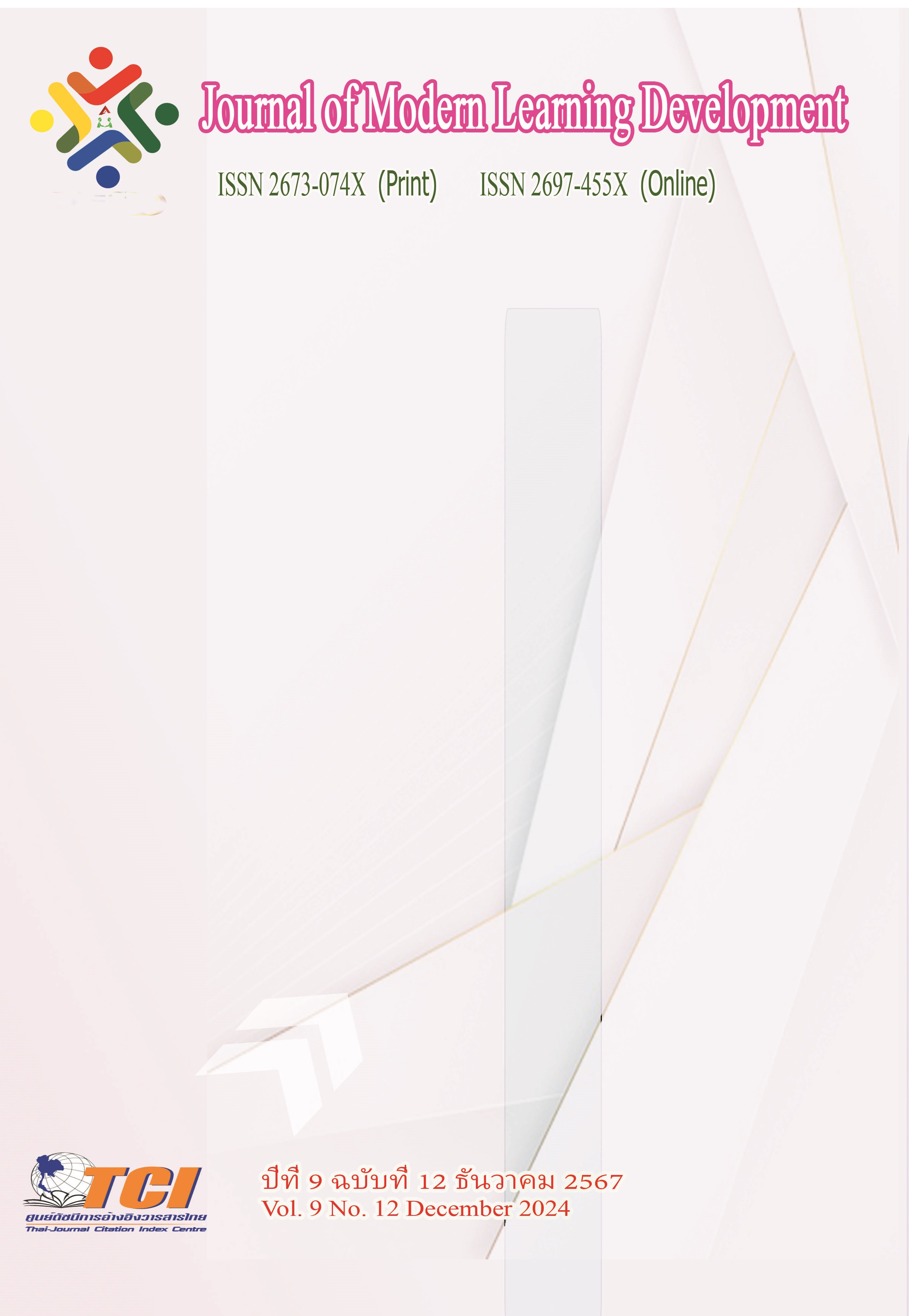Service-Oriented Leadership of the School Administrators AffectingOrganizational Climate in Educational Institutions under the Secondary Educational Service Area Office, Bangkok 1
Main Article Content
Abstract
This research aims to: 1) study the level of service-oriented leadership of the school administrators under the secondart educational eervice area office, Bangkok 1; 2) study the level of organizational climate in educational institutions within the same area; 3) study the Affecting of service-oriented leadership on the organizational climate. The sample consisted of 371 school administrators and teachers from the 2023 academic year, using stratified random sampling based on school size. Data was collected using a questionnaire, and statistical analysis involved percentages, means, standard deviations, and stepwise multiple regression analysis.
The findings reveal that overall, the service-oriented leadership of The School administrators is rated highly, with the highest average in the aspect of maintenance, followed by community building, with empathy scoring the lowest. The overall organizational climate is also rated highly, with commitment scoring the highest, followed by support, and standards scoring the lowest. Service-oriented leadership significantly influences the organizational climate at a statistical significance level of .01. The most influential variables in predicting organizational climate are emotional healing (X3), community building (X10), commitment to people development (X9), vision sharing (X6), valuing input (X1), forward-looking (X7), and maintenance (X8), together predicting 80.70% of the variance in organizational climate (R² = 0.807).
Article Details
References
คมกฤช ประการะสังข์. (2559). ภาวะผู้นำแบบรับใช้ของผู้บริหารสถานศึกษาที่ส่งผลต่อการบริหาร แบบมีส่วนร่วมในการบริหารงานของสถานศึกษา สังกัดสำนักงานเขตพื้นที่การศึกษา ประถมศึกษาชลบุรี เขต 1. วิทยานิพนธ์ครุศาสตรมหาบัณฑิต : มหาวิทยาลัยราชภัฏราชนครินทร์.
จุลลี่ ศรีษะโคตร และ ดร.วัลลภา อารีรัตน์. (2557). บรรยากาศองค์การที่ส่งผลต่อชุมชนการเรียนรู้ทางวิชาชีพของครูในสังกัดเทศบาลนครขอนแก่น. ออนไลน์. Jeournal of ducation Khonkaen UNIVERSITY. ปีที่ 38 ฉบับที่ 1 (2015) : มกราคม-มีนาคม 2558. สืบค้นเมื่อ 12 พฤษภาคม 2567. แหล่งที่มา : https://so02.tci-thaijo.org/index.php/EDKKUJ/article/view/47835/ 39698.
ฉวีวรรณ เอี่ยมพญา และประเสริฐ อินทร์รักษ์. (2560). บรรยากาศองค์การที่ส่งผลต่อคุณภาพชีวิตการทํางานของครูในโรงเรียน สังกัดสํานักงานเขตพื้นที่การศึกษามัธยมศึกษาเขต 8. วิทยานิพนธ์ศึกษาศาสตรมหาบัณฑิต : มหาวิทยาลัยศิลปากร.
ธาดา วิกัยวราภรณ์, อุไรรัตน์ แย้มชุติ และวิเชียร อินทรสมพันธ์ (2567). ภาวะผู้นำทางวิชาการของผู้บริหารสถานศึกษาที่ส่งผลต่อการเป็นองค์กร แห่งการเรียนรู้ของสถานศึกษาขั้นพื้นฐาน สังกัดกรุงเทพมหานคร กลุ่มกรุงธนเหนือ. ออนไลน์. Journal of Modern Learning Development. ปีที่ 8 ฉบับที่ 7 (2023) : กรกฎาคม 2566. สืบค้นเมื่อ 10 พฤษภาคม 2567. แหล่งที่มา : https://so06.tcithaijo.org/index.php/
jomld/article/view/260898.
บุณฑริกา แจ้งเจริญกิจ, (2556). บรรยากาศองค์การที่มีอิทธิพลต่อพฤติกรรมการเป็นสมาชิกที่ดีขององค์การของบุคลากรสำนักงานอธิการบดี มหาวิทยาลัยมหิดล. ออนไลน์. Journal of Educational Administration Silpakorn University. ปีที่ 3 ฉบับที่ 1 (2012) : กรกฎาคม - ธันวาคม 2555. สืบค้นเมื่อ 12 พฤษภาคม 2567. แหล่งที่มา : https://so02.tci-thaijo.org/index.php/EdAd/ article/view/57662/47765.
พิเชษฐ์ สร้อยทอง, วิสุทธิ์ วิจิตรพัชราภรณ์ และมณฑป ไชยชิต. (2561). บรรยากาศองค์การและแรงจูงใจในการทำงานที่ส่งผลต่อการมีส่วนร่วมในการประกันคุณภาพภายในของสถานศึกษาสังกัดสำนักงานเขตพื้นที่การศึกษามัธยมศึกษา เขต 1. ออนไลน์. Educational Management and Innovation Journal. ปีที่ 1 ฉบับที่ 1 (2018) : มกราคม-เมษายน 2561. สืบค้นเมื่อ 10 พฤษภาคม 2567. แหล่งที่มา : https://so01.tci-thaijo.org/index.php/emi/issue/view/10421/emi_v1n1.
รสสุคนธ์ รุดชาติ. (2550). ความสัมพันธ์ระหว่างบรรยากาศองค์การกับความพึงพอใจของ ครูในโรงเรียนที่จัดการเรียนการสอน ช่วงชั้นที่ 3 และ 4 สังกัดสำนักงานเขต พื้นที่การศึกษาลําปาง เขต 2. วิทยานิพนธ์ปริญญาครุศาสตรมหาบัณฑิต : มหาวิทยาลัยราชภัฏลำปาง.
วิเชียร อินทรสมพันธ์, วิเชียร ทุวิลา และปราณีต ม่วงนวล, (2567). การเสริมสร้างคุณลักษณะครูไทยในศตวรรษที่ 21 ของนักศึกษาครู มหาวิทยาลัยราชภัฏบ้านสมเด็จเจ้าพระยาโดยใช้รูปแบบการจัดการเรียนรู้แบบผสมผสาน. ออนไลน์. Journal of Roi Kaensarn Academ. ปีที่ 9 ฉบับที่ 4 เมษายน 2567. สืบค้นเมื่อ 10 พฤษภาคม 2567. แหล่งที่มา : https://so02.tci-thaijo.org/index.php/ JRKSA/article/view/267243.
วัฒนา พรมลารักษ์ (2559). บรรยากาศองค์การของโรงเรียนเทศบาลในจังหวัดเลย. ออนไลน์. Humanity and Social Science Journal. ปที่ 22 ฉบับที่ 2 (2016) : พฤษภาคม-สิงหาคม 2559. สืบค้นเมื่อ 12 พฤษภาคม 2567. แหล่งที่มา : https://so05.tci-thaijo.org/index.php/tgt/article/view/ 67576/55149.
ศิรินทิพย์ เพ็งสง. (2563). ภาวะผู้นำใฝ่บริการของผู้บริหารสถานศึกษา สังกัดสำนักงานเขตพื้นที่การศึกษาประถมศึกษาพัทลุง เขต 1. วิทยานิพนธ์ปริญญาศึกษาศาสตรมหาบัณฑิต :มหาวิทยาลัยเทคโนโลยีธัญบุรี.
ศิริวรรณ จันทรัศมี. (2558). การพัฒนาหลักสูตรฝึกอบรมภาวะผู้นำใฝ่บริการสำหรับผู้บริหารสถานศึกษาเอกชน จังหวัดชลบุรี. ดุษฎีนิพนธ์ปรัชญาดุษฎีบัณฑิต : มหาวิทยาลัยบูรพา.
สํานักงานคณะกรรมการการศึกษาขั้นพื้นฐาน. (2562). พระราชบัญญัติการศึกษาแห่งชาติ (ฉบับที่ 4) พ.ศ.2562. ออนไลน์. สืบค้นเมื่อ 12 พฤษภาคม 2567. แหล่งที่มา : https://www.moe.go.th/wp-content/
uploads/2022/01/MOE-Authority.pdf
อมรา กาฬสมุทร, เก็จกนก เอื้อวงศ์ และพิชิต ฤทธิ์จรูญ. (2564). ความสัมพันธ์ระหว่างภาวะผู้นำใฝ่บริการของผู้บริหารสถานศึกษากับบรรยากาศองค์การของสถานศึกษาสังกัดสำนักงานเขตพื้นที่การศึกษาประถมศึกษาชุมพร เขต 2. วิทยานิพนธ์ศึกษาศาสตรมหาบัณฑิต : มหาวิทยาลัยราชภัฏมหาสารคาม.
Best, John W. (1970). Research in Education. New Jersey: Prentice-Hill.
Daft R.L. (1999). Leadership : Theory and practice. Forth Worth: TX: Dryen Press.
Laub, J. A. (2004). Organizationg Leadership Assessment (OLA) Model. Defining Servant leadership and the heathy organization. [online]. Retrieved May 15, 2024. From http://wwww.
olagroup.com/Display@sp?Page=servantleadershipLeadership.
Oasis, et al. (2023). The role of servant leadership in creating a positive school climate. [online]. Science and Education Scientific Journal. May 2023 Volume 4 Issue 5. Retrieved May 19, 2024. Fromhttps://www.researchgate.net/publication/371609 771_The_role_of_
servant_leadership_in_creating_a_positive_school_climate.
Robert Stringer. (2002). Leadership and Organizational Climate. New Jersey : Prentice Hall.
mplications. New York : Basic Book.
Spears, L. C. & Lawrence, M. (Eds.). (2002). Focus on leadership : Servant-leadership for the 21st century. New York : John Wiley & Sons.
Taro Yamane. (1973). Statistics: an introductory analysis. New York : Harper & Row.
Zhou ZhengFa, Wichian Intarasompun, and Nuttamon Punchatree (2024) The Leadership Characteristics of Administrator of Chongqing Normal University. [online]. Journal of Modern Learning Development. 9, 6 (June. 2024). Retrieved May 19, 2024. From Retrieved from: https://WWW.so06.tci-thaijo.org/index.php/jomld/article/view/268 702.


